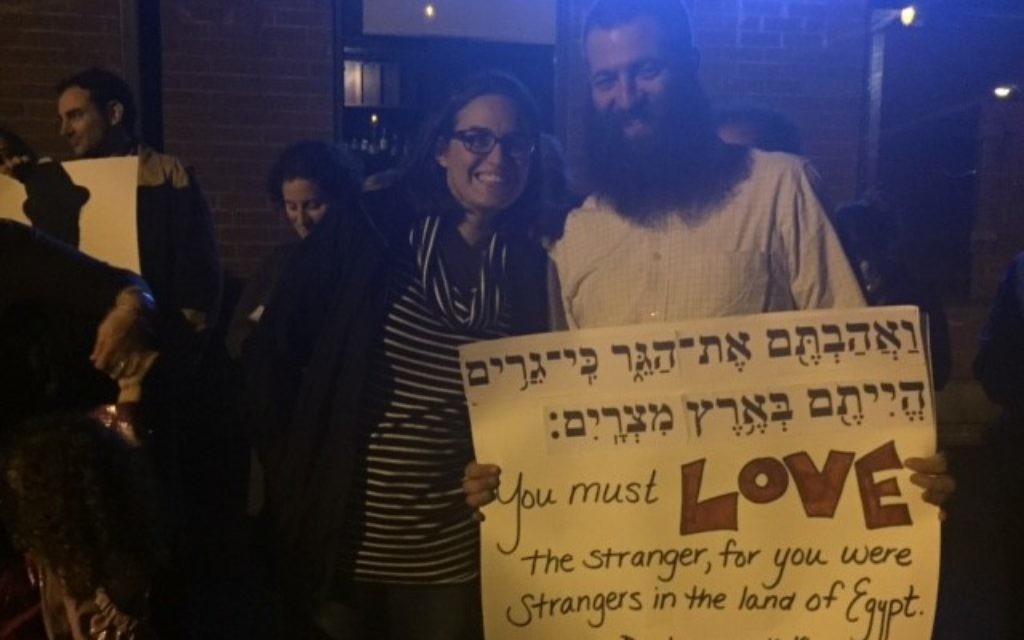Editor’s Notebook: Remembering Effective Resistance
We’ve all heard George Santayana’s warning that those who do not remember the past are condemned to repeat it. But too many people mistakenly think that not forgetting is the same as remembering.
The difference came to mind as I watched IfNotNow’s impassioned Facebook broadcast Sunday night, Dec. 4, in an effort to build a national community of Jewish resistance after the #JewishResistance rallies in Atlanta and two dozen other cities Nov. 30.
Read More: Atlanta’s #JewishResistance Protests Bannon
A thriving republic relies on a vibrant opposition to check the power of the ruling faction, so it’s valuable to all of us that there are people frustrated enough with our politics and fearful enough of Donald Trump to take to the streets and protest and, as they did Dec. 4, take to Facebook and organize.
Get The AJT Newsletter by email and never miss our top stories Free Sign Up

It doesn’t matter whether this resistance is right about the dangers posed by Trump and his senior strategist, Steve Bannon. No matter how pure their intentions, Trump and his team will make mistakes, and it’s important to have active watchdogs.
One of the crucial lessons of the past we must remember is that tyranny thrives in silence. If no one is willing or able to challenge a power grab, an authoritarian leader will keep grabbing more.
So it was a good thing that more than 40 Jewish Atlantans rallied Nov. 30 against many expressions of hate. Whether Muslims or immigrants or LGBTQ people or Jews or women have a real reason to be fearful is less important right now than reminding the president-elect that no American leader has free rein. We’re a nation of laws, and that applies to all sides, no matter who is in power.
But there are problems with a Jewish resistance led by IfNotNow.
The most obvious is that IfNotNow formed in opposition to Israel’s occupation of the West Bank. Every time a would-be #JewishResistance leader talks about Israeli oppression of the Palestinians — and most of the stories told during the IfNotNow live video Dec. 4 focused on Israel — that movement loses Jewish support.
IfNotNow members offered repetitive rhetoric about Trump and Bannon, but their passions and their personal stories revolved around the Israeli-Palestinian conflict. As exemplified by their White Rose Campaign to bombard the Jewish establishment with flowers of protest, their resistance seems aimed more at our communal institutions than our new national leaders.
They might be right that attacking Jewish communal institutions is the best way to gain momentum for American Jewish pressure on Israel to take steps toward peace with the Palestinians, and unfairly labeling our Jewish leadership as facilitating if not outright supporting white supremacism and racism might help IfNotNow and like-minded organizations achieve a dramatic communal shake-up. (I doubt it, but I’m a lousy prognosticator.)
But the vital lesson they’re failing to remember is that mass movements for change succeed only when they unify around one issue. Trying to build a coalition of groups with different goals, even if those goals are compatible, rarely works. We saw such a failure of overreach recently with the Movement for Black Lives platform, which cost the Black Lives Matter movement significant Jewish support with a malicious attack on Israel but also was so broad that it stifled any hope of moving forward.
If the activists of IfNotNow truly want to build a movement that can stand up to Trump, they should put aside their Israel concerns for later and focus on domestic issues now. And they need priorities.
The civil rights movement went after and achieved one goal at a time. That’s a historical example any serious Jewish social justice movement (as opposed to niche organizations) must remember if it hopes to be a national force the next four years.





comments